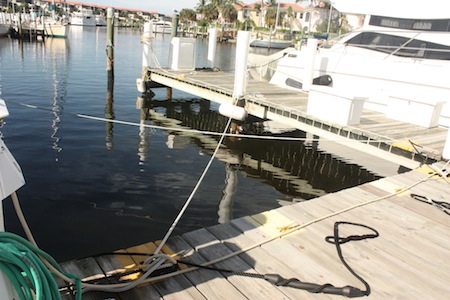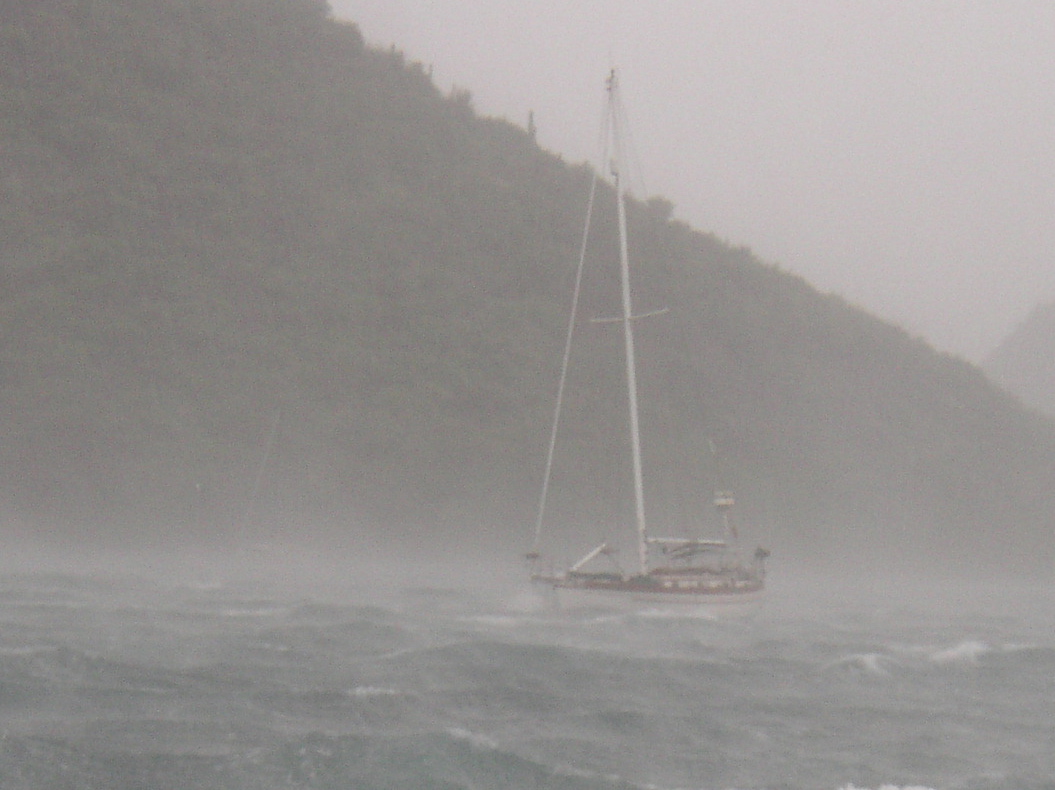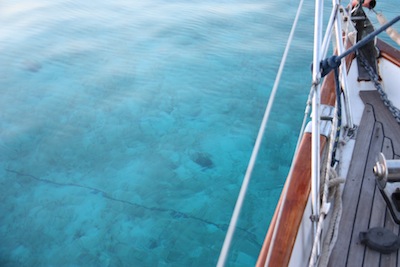
Did you ever wonder how singlehanders manage to get their boats in & out of their slips? We’re not overly experienced with being at a dock, most of our cruising prior to the last two years has been on the hook, not even a mooring ball in sight. But now that we’re back in southwest Florida at least temporarily, we were actively looking around at how everyone else does it — especially those that make it look so easy in a 20 mph crosswind!
The boat across the dock from us, s/v War Dept, is a Pacific Seacraft 37 — same size as Winterlude, our Passport 37. Nick often singlehands the boat and has his little trick for returning to the dock easily and safely.
It’s so simple – Nick stretches two extra docklines in a cross to hold the bow in place as he glides into his slip. The extra lines stay fastened to the dock, but are only deployed when he leaves. Some boats choose to leave them in place all the time, but we found the line rubbed on Winterlude’s bow.

So add crossed lines and keep your bow in the center of the slip (more or less) even in a fresh breeze — crosswind, of course. 🙂
Do you have tips on returning to your slip? Please leave a comment and share! THANKS! Jan













I used to teach a single line docking manuver. Cleat a line loosely from your winch, under your life lines, to a stern cleat. Motor into your slip as slowly as you can get away with. Drop the loop of line over the aftmost dock cleat as you enter the dock. Keep the transmission in forward. The boat will stop and stay right next to the dock, giving you plenty of time to fasten the bow and spring lines.
Thanks Dave! A bit of clarification? We’re wondering if this neat trick will work with half or 3/4 length docks with pilings, not cleats at the end.
Also, the only “winch” we have forward is the anchor windlass? Or are you talking a cleat forward? Then under the lifeline and back to a stern cleat? And the loop is the line draped outside the lifeline? So if the first “cleat” that’s available to drop the line over would be the one on the dock about halfway back the slip? Sorry to be dense, but we’re curious to see if we could make this work for us. Cheers — Jan
Sorry about the murky post. To clarify, the line runs from your stern cleat to a cockpit winch, with a loop of line laying over the lifeline. Fix the line on the same side as the dock.
I don’t see why the same technique wouldn’t work on a piling.
It would be good to practice this first. Use a long, empty dock, like a marina gas dock after hours. Once you get the hang of it, it’s pretty easy to dock singlehandedly. You’ll find you can even “steer” the boat by turning the wheel/tiller.
Good thing you provided one good tip on how to singlehandedly manage to dock your own boat which is to stretch two extra dock lines in a cross to hold the bow in place. I’ve actually never tried this before on my own boat because I always got used to having a couple of buddies to assist me with parking. I will certainly try this one out the next time I go on a fishing trip and see if it also works for me. Thanks.
A clarification – or modification – on short/single-handed mooring alongside, borrowed from an earlier century. Decide which side will be ‘to’ the quay/pontoon, and approach bows to the stream if tide is running. Have a mooring line fed forward from a self-tailing sheet winch along the deck, then through a closed fairlead or a snatch block on the rail at/forward of the max. beam. This line is then led back outside everything, a bowline loop tied in the end, and this is draped back in over the lifelines beside the helmsman’s hand.
Make the approach slowly with just enough rudder authority ( bows to tide helps ) then drop the bowline loop over the first available pontoon/quay cleat. Pull the other end on the self-tailing winch taut. This will stop the boat. Put tiller towards the pontoon/quay and leave in tickover ahead. The boat will tuck in and sit quietly alongside.while you secure other mooring lines.
I like this trick to use a cross to hold the bow in place as you enter the slip. My husband and I just purchased a boat, and we want to get a good dock for it at our lake house. We’ll definitely keep this cross idea in mind to make it easier to dock.